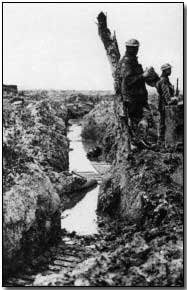More World War I reading
 Last month I posted a list of books on The Great War that I'd read to help with my writing of Walter's First World War experiences. One of the books I mentioned was Max Arthur's Forgotten Voices of The Great War. Today's Guardian has an article by Arthur called "Lest We Forget," which includes a series of interviews with the few remaining veterans of WWI. Here are a couple of snippets:
Last month I posted a list of books on The Great War that I'd read to help with my writing of Walter's First World War experiences. One of the books I mentioned was Max Arthur's Forgotten Voices of The Great War. Today's Guardian has an article by Arthur called "Lest We Forget," which includes a series of interviews with the few remaining veterans of WWI. Here are a couple of snippets:Henry Allingham109 (born June 6 1896)
Air mechanic, Royal Naval Air Service:
I got up in the night, took a couple of paces and fell straight into a shell hole. It was absolutely stinking. There was everything in there, you name it - dead rats, no end of rats. You know what they fed on in this hole? The bodies of the boys listed as missing.
So there I was, in this filthy great big hole. I decided to take a chance and I moved to the left. If I'd gone to the right, I don't know what would have happened. It was shallow and I managed to get to my feet, and I tried to climb out. I tried several times, but no joy. Somehow, though, and I don't know how, I heaved my belly up on to the side, and I could just pull myself out. I was soaking wet, right up to my armpits, but I had to stay where I was until daylight. I didn't dare move again. I wore that kit until it dried off on my body.
Alfred Anderson 109 (born June 25 1896)
Sergeant, 5th Battalion (TA) Black Watch
Conditions in the trenches were terrible. We slept on sandbags and there were rats everywhere. They used to gnaw through the phone cables so our communications were cut off. We often had to stand up to our knees in water and I got trench foot.
As well as normal duties, I was detailed to look after one of the officers - Lieutenant Bruce-Gardyne - and when he went away on a course, I was posted for a while as batman to Captain Fergus Bowes-Lyon, the brother of the late Queen Mother. He was from Glamis, which isn't far from my home in Newtyle. I really regret that I never got to meet the Queen Mother and tell her about my time with her brother before he was killed at Loos in 1915. He was a fine young man. A meeting was mooted once when she was at Glamis, but she took ill and it never happened.
Harry Patch107 (born June 17 1898)
Private, Duke of Cornwall's Light Infantry
Last year I went back to Ypres, where I met one of the last surviving German veterans of the war, Charles Kuentz, who was 107. It was very emotional. We had both been on the same battlefield at Pilckem Ridge. For a while I hadn't wanted to meet him, but I got a letter from him in Germany and he seemed like a nice man and I decided I would meet him. He was a nice man and we talked, then we both sat in silence, staring out at the landscape. Both of us remembering the stench, the noise, the gas, the mud crusted with blood, the cries of the fallen comrades. We had both fought because we were told to. Sadly, he died a year after I met him.
Click on the article's link in the first paragraph to read the complete interviews. By the way, one book that I left off last month's list is Tommy by Richard Holmes. It's another one I picked up in England when I was there in May, but it's readily available here in the U.S.

0 Comments:
Post a Comment
Subscribe to Post Comments [Atom]
<< Home